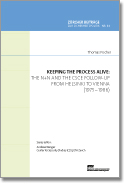Keeping the Process Alive

The N+N and the CSCE Follow-Up From Helsinki to Vienna (1975-1986)
Author(s): Thomas Fischer
Series Editor(s): Andreas Wenger
Series: Zürcher Beiträge zur Sicherheitspolitik
Issue: 84
Publisher(s): Center for Security Studies (CSS), ETH Zürich
Publication Year: 2012
Publication Place: Zürich
